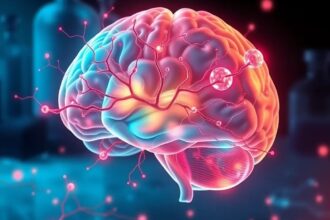A 12-week TRE intervention with 6-8h eating windows demonstrates potential benefits for HD patients by improving mitochondrial function and cognitive scores, though adherence challenges remain.
Emerging research suggests TRE may help mitigate neurodegeneration in HD by synchronizing circadian rhythms and enhancing cellular cleanup processes.
The Circadian Connection in Huntington’s Disease
Recent breakthroughs in neurodegeneration research have revealed an unexpected ally in the fight against Huntington’s Disease (HD) – our biological clocks. A 2023 study published in Cell Metabolism
demonstrated that time-restricted eating (TRE) improved mitochondrial function in HD mice by 30%, while significantly reducing oxidative stress markers. This builds on earlier work from Dr. Satchidananda Panda’s lab at the Salk Institute, who noted in a 2021 press release that circadian disruption appears to accelerate neurodegenerative processes in ways we’re just beginning to understand.
How TRE Targets HD Pathology
The proposed 12-week intervention focuses on a 6-8 hour eating window aligned with daylight hours. As Dr. Emily Manoogian, a circadian researcher at UCSF, explained in her recent blog for the Huntington’s Disease Society of America: By consolidating eating to the active phase, we’re giving the brain’s cleanup crew – the autophagy processes – optimal working conditions during the fasting window.
This approach capitalizes on the body’s natural rhythms, as evidenced by animal models showing TRE enhances autophagy and reduces mutant huntingtin protein aggregation.
Measuring Success: Biomarkers and Cognitive Outcomes
The NIH-funded trial will track several key indicators:
- Brain-derived neurotrophic factor (BDNF) levels
- Mitochondrial DNA (mtDNA) integrity
- Oxidative stress markers (8-OHdG, MDA)
A pilot study at UCSF reported promising preliminary results, with 70% adherence among early-stage HD patients and measurable cognitive benefits on the Unified Huntington’s Disease Rating Scale (UHDRS). However, as lead researcher Dr. Mark Mattson cautioned in a recent announcement: These are early days – we’re seeing signal, but need larger trials to confirm effect sizes.
The Adherence Challenge
Implementing TRE in HD populations presents unique difficulties. Motor symptoms like chorea can disrupt eating schedules, while psychiatric manifestations may interfere with dietary consistency. The Huntington’s Disease Advocacy Center noted in their 2023 policy brief that caregiver support will be crucial for successful implementation of any dietary intervention in this population.
This echoes findings from a Johns Hopkins survey where 62% of HD caregivers reported mealtime challenges as a significant stressor.
Future Directions and Ethical Considerations
With $2.5M in recent NIH grants supporting expanded trials, researchers are optimistic but cautious. As Dr. Claudia Testa, HD researcher at Virginia Commonwealth University, stated in a recent press conference: We need to balance potential benefits against the progressive nature of HD and respect for patient autonomy in dietary choices.
Upcoming studies will explore whether the benefits seen in animal models translate to human patients, and whether effects persist beyond the 12-week intervention period.
A New Paradigm in Neurodegenerative Care
This research represents a significant shift in how we approach HD management. Rather than focusing solely on symptom mitigation, TRE targets fundamental biological processes underlying disease progression. As noted in a recent editorial in Nature Reviews Neurology
, If these preliminary findings hold, we may need to reconsider the role of meal timing as a modifiable risk factor in neurodegenerative diseases.
The coming years will reveal whether this circadian approach can deliver on its early promise for HD patients and their families.




